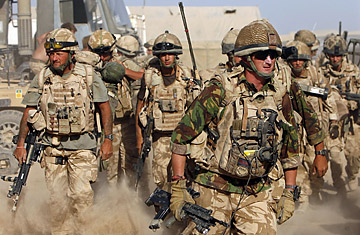
British soldiers from B Company, 2 Mercian, set off on an operation in Malgir, in Afghanistan's Helmand province, on July 27, 2009
When British forces entered Afghanistan in the autumn of 2001 in support of the U.S.'s fight against international terrorism, the aims of the deployment seemed clear and the effort justifiable. But as the conflict against the Taliban rumbles toward its ninth brutal year, America's most willing partner is asking the toughest of questions: How does this war end?
On Sunday, an influential panel of British politicians released a critical report on British involvement in Afghanistan, concluding that the effort to win the war has been hampered by unrealistic planning, a lack of coordination between the military and diplomatic corps and the absence of a clearly defined mission. The report says Britain's goal of fighting terrorists has been diluted by the competing aims of counterinsurgency, counternarcotics, protection of human rights and state-building.
"We conclude that there has been significant 'mission creep' in the British deployment to Afghanistan," says the report by the House of Commons Foreign Affairs Select Committee. "We recommend that in the immediate future the Government should refocus its efforts to concentrate its limited resources on one priority, namely security."
British forces recently completed a major offensive against insurgents in southern Afghanistan's Helmand province — Operation Panther's Claw — that cleared the Taliban from swathes of the area. Now British war planners have called for an increase in troops to hold the land gained in that offensive. A report due out later this month by U.S. General Stanley McChrystal, head of NATO forces in the country, is widely expected to call for an even further increase of British commitment across the region.
But against these short-term military needs lie the questions of how long Britain must commit its troops to succeed in Afghanistan and what success will look like in a country rife with corruption and lawlessness. The head of the British army, Sir Richard Dannatt, has said before that the country should be committed to Afghanistan for the "long haul." On Sunday, Sir Nigel Sheinwald, Britain's ambassador to Washington, put the time frame as "decades."
Whether the British public is willing to back a violent campaign over such a protracted period is uncertain, however. The buildup and execution of Operation Panther's Claw led to the bloodiest month to date for British forces in Afghanistan, with 22 British personnel killed in July. The financial cost of the campaign is mounting too: according to a report in the Times of London, spending on Britain's military operations in Afghanistan has more than trebled, from $1.3 billion in 2006-'07 to $4.4 billion in 2008-'09. And there are indications that the British public's patience is wearing thin. Last month a decision by the Ministry of Defense to try to reduce compensation paid to injured soldiers sparked a backlash that forced the MOD to reverse its decision.
Contentious as it may be, the need to consolidate the success of Panther's Claw will make the logic for sending additional British troops to Afghanistan irresistible, according to Paul Cornish, head of the International Security Program at the London-based think tank Chatham House. Eventually, however, the British public will demand that politicians articulate an endgame. "Britain will commit additional troops because there's such a sound logic to it militarily," says Cornish. "But I can't see how we can plan to be there for the next two or three decades. I just don't see how that's possible, both politically and militarily."
Prime Minister Gordon Brown, whose Labour Party faces a general election in the coming year against a Conservative opposition bolstered by public discontent over the Iraq war, has indicated that his government will search for a diplomatic solution to the conflict. At a speech at NATO headquarters in Brussels on July 27, Foreign Secretary David Milliband urged military commanders to open negotiations with midlevel Taliban leaders in order "to separate hard-line ideologues who are essentially irreconcilable and violent from those who can be drawn into a domestic political process."
The emphasis on diplomatic measures in Afghanistan comes at a time when NATO officials see Britain's commitment as essential to the security of the alliance. Britain has the highest number of troops in Afghanistan behind the U.S.; while other European countries have sent troops only for nation-building exercises in stable parts of the country, the Brits (along with the Canadians) have taken heavy casualties. In his first speech as the new head of the alliance on Monday, Secretary General Anders Fogh Rasmussen reiterated that NATO's priority must be the war in Afghanistan. "NATO is a strong military alliance, and we need a strong military effort in Afghanistan," he said.
For its part, Britain's House of Commons Foreign Affairs Select Committee says NATO's inability to even the burden-sharing among member countries undermines the central mission of the alliance and raises the "real possibility that without a more equitable distribution of responsibility and risk, NATO's ... reputation as a military alliance, capable of undertaking out-of-area operations, [will be] seriously damaged."
In Britain, however, the war in Afghanistan has led to soul-searching over the role of the country's troops not only in NATO but in the wider world as well. Still shaped by its fortitude in the "good war" against the Nazis, Britain has had its conception of its military power — and its confidence in what it's fighting for — shaken by the more recent conflicts in Iraq and, now, Afghanistan. "We still have a very strong and patriotic affection for our troops," says Chatham House's Cornish. "But many British people feel conflicted by the desire to support our troops and impatience with their role in wars that either seem morally dubious or open-ended."
